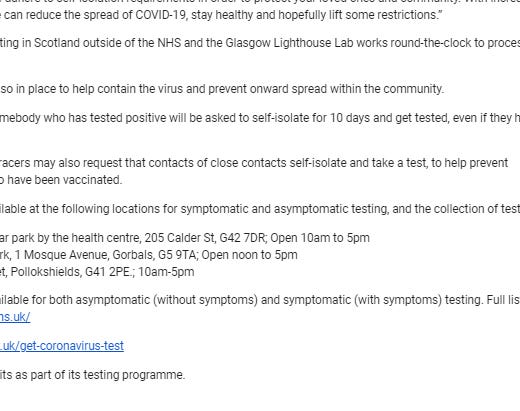Beyond Black or White
Recognising complexity isn't necessarily a disadvantage when confronting simplistic politics.
A decade ago I was living in Rwanda. It isn’t known as the land of a thousand hills for nothing. My journey to work every day would take me from the top of the hill we lived on, down into a valley where poorer citizens lived, and then back up again. The night before one commute I had been reading Alisdair Gray’s Lanark, and a line spoken by the psychiatrist character had stuck in my head:
“The truth, you know, isn’t black or white, it’s black and white. I keep a ceramic zebra on my mantelpiece to remind me of that.”
The next morning, down in the bottom of the valley, we passed a pottery stall run by Twa people and I noticed a ceramic Zebra. I took it as a sign, jumped out of the car, bought the Zebra and it now sits on my shelf to remind me of the psychiatrist’s lesson.
One of the things that makes me suspicious of nationalism is that it constantly seeks to categorise the world into black or white. The complexity of how we live is ignored as nationalism invites us to identify as one thing rather than the many things that define us. The policy debate is reduced to one choice above all others. Politics is polarised around an exclusive choice rather than seeking to reconcile myriad interests and issues.
Two stories this week made me glance up at my zebra.
The Mind of Middle Scotland
Our Scottish Future released some insightful polling that seeks to look at the areas of grey overlooked by the binary YES/NO opinion polls. It offers the kind of analysis that normally only campaign managers get to see. This slide, in particular, is worth looking at.
Complicated isn’t it?
There is a warning in the data against something that I’ve written about before: we shouldn’t approach the constitutional debate as if it is a fight to be won by one of two entrenched factions. The polling shows that the voters in the middle who decide what happens in elections don’t think in black or white, but rather in black and white:
Behind the binary Yes/No choice, there is a middle Scotland who have a more nuanced view of the issue than the main antagonists. This 40% is bigger than either of the pro-Union or pro-Independence camps.
Beyond the exclusive British or Scottish choice we are invited to make by nationalism, these voters in the middle have a more pluralistic identity. They rate themselves 7.6 out of ten in terms of feeling Scottish and 5.6 out of ten British.
Rather than taking sides in conflicts between Bute House and Downing Street, two-thirds of the middle voters want more cooperation between both their governments. However, only one in four currently believe that the two governments work well together now.
Elections and referendums are won by the campaign that can persuade more of those in the middle to support them. Nationalists and populists around the world have succeeded in this by offering simplistic answers that offer an easy certainty in an insecure and confusing world. However, this facile approach to politics can be their fatal flaw.
The overlooked reason that our campaign won the referendum in 2014 was that we didn’t try to force voters into the kind of binary, exclusive choices that the Yes campaign did. Because nationalism is a reductive view of the world, it ends up offering less choice to people.
Inside Better Together we described the difference between the two campaigns as AND versus OR. Voters in the middle wanted to be Scottish and they also felt British. They wanted to make decisions in Scotland and they wanted to share risks with others across this island. They wanted change and continuity. The populist OR choice offered by the nationalist side was intended to remove anxiety, but because it was met by an AND choice on our side it had the opposite effect. People opted for more when presented with the opportunity to choose less.
For those who want to remain in the UK, recognising complexity in our messaging is, ironically, the way to defeat the simplistic politics of nationalism.
Middle Ground on Immigration
The second example of how nationalism offers false, exclusive choices came in the maiden speech of a newly-elected SNP MP. Anum Qaisar-Javed made a case for immigration, drawing on her own family’s inspirational story of making a success of life in Scotland. But then she said this:
“The points-based immigration system championed by the Government is deeply flawed…This is one of the reasons why Scotland needs independence.”
While many, including me, agree with the premise of her argument, the conclusion makes little sense. For starters, the SNP’s White Paper on Independence launched by Nicola Sturgeon had this to say on immigration:
“We plan a controlled points-based system to support the migration of skilled workers for the benefit of Scotland's economy.”
Leaving that aside, dissolving The Union in order to change immigration policy is using a sledgehammer to crack a nut. We see in other states different immigration criteria in different areas - for example, lower-income thresholds being set to better reflect regional economies. Some countries have a national immigration policy and then a regionalised system where the sub-national government can relax immigration criteria to manage populations.
The current immigration system includes visas that are dependent on a job offer in a specific occupation where there are shortages of labour. Visas could be offered dependent on working in a specific area of the UK. Rather than lazily making every policy argument a subset of the constitutional debate, we could argue for better, rather than simply separate, government.
When Labour lead the devolved government, Jack McConnell worked with the UK Government to introduce the Fresh Talent scheme which allowed students studying in Scottish universities to stay in the country after graduation. The SNP Government should work with other devolved governments to argue for devolving aspects of immigration and the Home Office should respond to this constructively. That would be an example of the kind of cooperation the voters in the middle want.
In Case You Missed It
One thing that is black and white in Scottish politics is the Freedom of Information requests that come back from the SNP government heavily redacted. There is a truly shocking story today about how the agency responsible for recording deaths in Scotland unlawfully withheld information about deaths in care homes for eight months.
The huge number of deaths in care homes has rightly been described as the most serious failure in the history of devolved government. It should not have taken a joint effort by The Scotsman, The Herald, DC Thomson and STV for this information to have been made public. The media and transparency campaigners have complained for years that the party that claims to stand for Scottish democracy have been eroding Freedom of Information. This story is a reminder that the culture of secrecy in government isn’t an inconvenience for journalists, it makes us all less safe.
The scandal of the state of Scotland’s ferry network continues with repairs to the newest ship in Cal Mac’s ageing fleet delayed again. Alf Young asked in the Times why, after 14 years of neglect, SNP parliamentarians representing island communities are only now speaking out on the mismanagement of these lifeline services. With the two ferries still sitting at Inverclyde, now five years behind schedule and twice the original price, islanders have had enough. In an exasperated letter to the First Minister, Comhairle nan Eilean Siar (Western Isles Council) make it clear that they no longer have faith in Holyrood’s administration of their services:
“Past decades have provided ample evidence that the decisions around ferry services cannot be competently made from Edinburgh, Glasgow or Inverclyde and that new ways need to be found to listen to islanders and allow us to inform the shape of our future ferry networks and not to impose solutions on us that have all too often proved ineffective. “
In the week when new figures show child poverty rising in every part of Scotland, Gina Davidson in the Scotsman questions why Nicola Sturgeon’s reshuffle this week relegated social security out of her Cabinet.
As John Swinney’s time in charge of Scottish Education comes to an end The Times Educational Supplement took a look at what he achieved. Meanwhile, newly elected Labour MSP Michael Marra writes with righteous anger as another exams debacle unfolds:
“Last years’ SQA exam fiasco – where the poorest pupils results were marked down simply because they were poorer than other kids – exposed much about the problems with the way Scottish education is run. Heads should have rolled and lessons should have been learned. Instead the same top brass in the Scottish Government and the SQA are presiding over a second year of exams chaos – only with this one they had plenty of time to plan.”
This audience member on Debate Night reminded us all that it is the most vulnerable who would pay the price for the austerity that would follow leaving the UK.
New Economic analysis from economist Tony Mackay on a Scottish currency concluded:
“It is obviously difficult to analyse the implications but my modelling suggests that the initial value of the Scottish pound would be 18 to 22 per cent lower than that of the pound sterling, and probably at the bottom end of that range.”
This is not a small consideration if you have a mortgage with a bank based in the rest of the UK. Oh, and he says the SNP’s new border with England will mean a sharp drop in exports across it.
Finally, I thought this was amusing.








